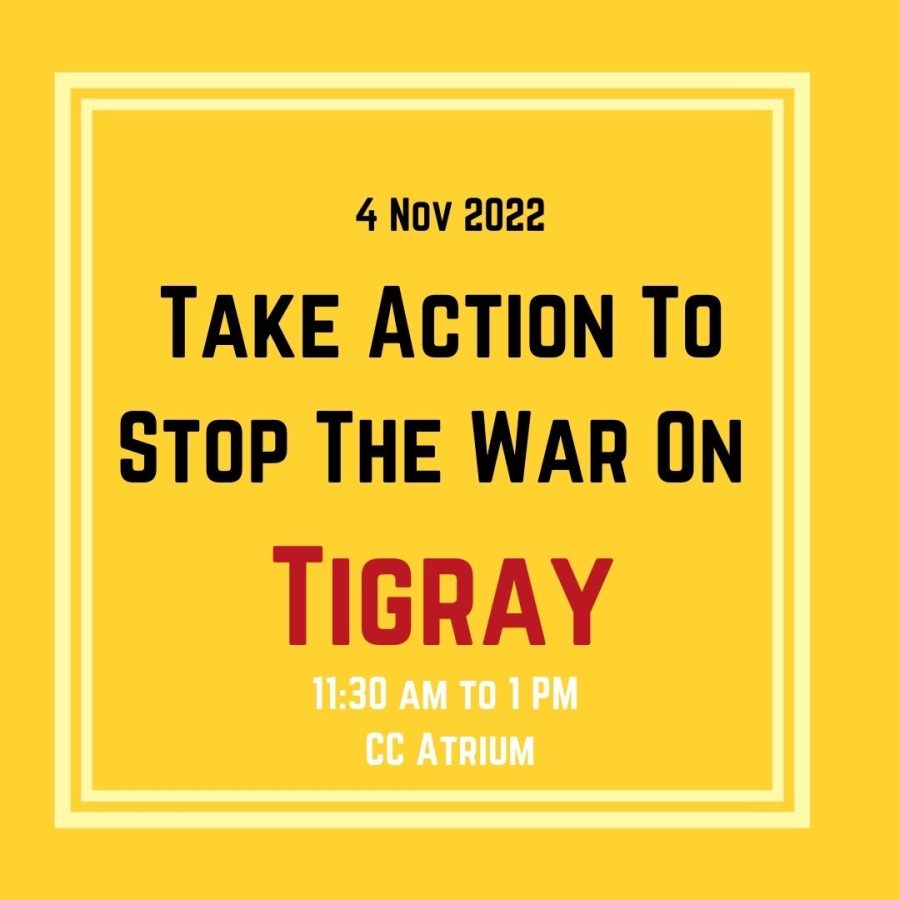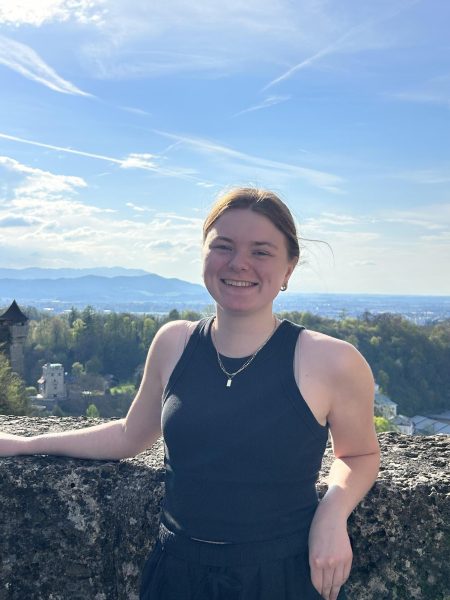Macalester student raises awareness for the War on Tigray
November 10, 2022
On Nov. 4, Feven Gebresilassie ’23 held an information session to educate the Macalester community about the war in Tigray after she noticed that there was little discussion about it at the school. Gebresilassie aimed to raise awareness and funds for this conflict, which has been going on for two years and has led to millions of displaced Tigrayans and hundreds of thousands of deaths.
The conflict in Tigray, the northernmost region in Ethiopia, started on Nov. 3, 2020. It is fought between the Tigray People’s Liberation Front (TPLF) and the Ethiopian federal government headed by the prime minister and former Nobel Peace Prize winner, Abiy Ahmed.
The conflict has historical roots as the TPLF controlled the country from 1991 to Abiy’s election in 2018. Since his appointment as prime minister, Abiy succeeded in decreasing the power the TPLF held over the country. In response to this increasing tension, Abiy and his forces are trying to oust the TPLF from their stronghold in Tigray.
The war has led to reports of mass crimes against humanity and war crimes with Abiy and his forces accused of committing ethnic cleansing and sexual violence against Tigrayan women and girls, internally displacing 2.2 million Tigrayans and killing over 600,000 people.
Despite the massive impact of this war, there has been little attention to it in western media and at Macalester, which is something Gebresilassie is trying to fix.
Gebrselassie’s main goal is to inform the Macalester community about what is going on. She organized an event on the second floor of the campus center for people to come by and learn more about the conflict, ask questions and donate to important causes.
“Our goal was mainly just to make sure that Macalester students know things that are happening today,” Gebresilassie said. “[We want to] spread the word [so that] whoever is able to donate, they can donate.”
The students that came to the event seemed eager to learn, according to Gebresilassie, whose pamphlets were in high demand.
“I think that the information and the way it was delivered, as opposed to it being ‘you sit down and it’s a talk’ worked really well,” Rayan Hamid ’22, a friend of Gebresilassie who helped organize the event and who has supported Gebresilassie throughout this process, said. “A lot of people came, and a lot of people asked questions. And I think that was the main goal.”
The Nov. 4 event took place two days after a ceasefire was called. However, it is unclear if this will stop the fighting as past ceasefires have failed. Gebresilassie says that, regardless if the ceasefire works or does not work, now is the time to help Tigray.
“It feels too soon to celebrate,” Gebresilassie said. “This is not the first time that this thing has happened and a lot of cities are still under attack.”
Gebresilassie is the only Tigrayan student at Macalester and when she saw no one else talking about this conflict she took it upon herself to raise awareness. However, this decision did not come lightly.
“My main goal is for the Macalester community to know about what’s happening and hopefully stay updated with it — but in a way that’s not detrimental to my mental health,” Gebresilassie said. “It’s such a very difficult and unique experience to go through alone.”
Gebresilassie has wanted to put on an event since the conflict started but due to many reasons, from the pandemic to the fear of the vulnerability it would take to talk about something so personal to her and her family, she waited to be more emotionally prepared to start.
“I felt like activism comes from a comfortable place, like there is some sort of grounding for you to be vulnerable,” Gebresilassie said. “In my personal experience, I don’t think I had that comfortable space.”
With time and support, Gebresilassie has gained some comfort, and earlier in the semester, she decided that now was the time to start her advocacy work at Macalester. She settled on Nov 4. as it marked two years since the war began.
“One of the reasons why I actually pushed myself to do this event was the fact that I was a senior,” Gebresilassie said. “I’m about to leave and it would sort of break my heart if Macalester kids did not know about what was happening.”
Aside from personal reasons, the conflict has been hard to cover and discuss because the Ethiopian government has cut Tigrayan access to aid as well as instituted a communication blockade. It is only recently that more information has been able to get out of the region.
Gebresilassie highlighted that despite being the only Tigrayan student, she has found support in other students and friends who have gone through similar conflicts around the world.
“[Knowing that] someone else is also sort of going through a similar situation, but on a different side of the world, that actually did make me feel a little bit more grounded and comfortable,” Gebresilassie said. “And also, in a way, it does create a community.”
Hamid, who is from Khartoum, Sudan, spoke about how she and others have supported one another through their common experiences.
“Not a lot of people can fully understand what it’s like or relate, but some of us because where we’re from can relate in some ways and that makes it a little bit easier to find a community going through something similar,” Hamid said.
The lack of media attention and knowledge at Macalester can be attributed to many factors, as Gebresilassie discussed.
“Things that happen in African countries are not always the trending news,” Gebresilassie said. “It’s always seen as something that’s like, ‘Oh, it’s just happening over there,’ And no one ever gets involved.”
Hamid also spoke on this topic. “As politically active as Macalester is, there is also a lot of selectiveness in different parts of the world if something is happening and how fast they will act and share information on it,” Hamid said. “There was a lot of ‘We’re not looking at this because it’s something that’s always been happening…’ but outside of Macalester and in general there’s a lot of silence in relation to what’s happened in Tigray.”
The event is just the beginning for Gebresilassie.
“It was a success, it really was a really good event,” Gebresilassie said. “But to be honest, it does feel like a start.”
In the future, Gebresilassie would like to work with the student organization AFRIKA! to update people on the conflict and continue raising funds for Tigrayans’ safety.
“It’s not just for the situation happening in Tigray, I know a lot of people who are going through a lot in terms of their home countries, going through a lot of instability.
If not for Tigray, [I want to] generally be for others who would need a hand or volunteer. It’s not something that will stop with this event,” Gebresilassie said.
To learn more and donate, please visit Oman Tigray.














